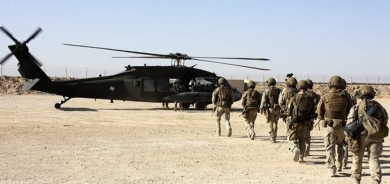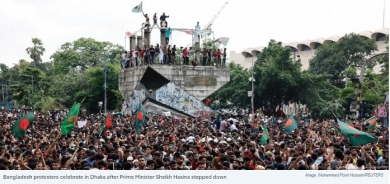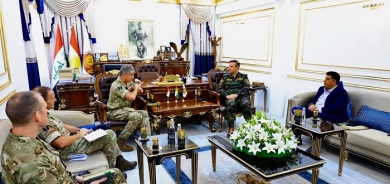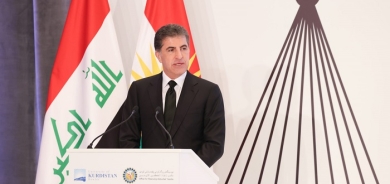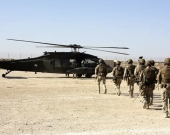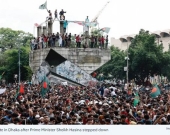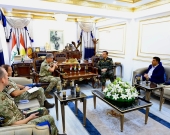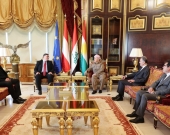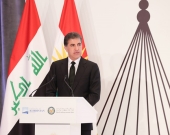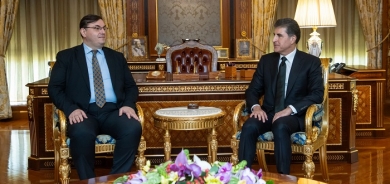Iraqi Sunni soldiers graduate amid complaints about equipment, low morale

Al-Taqaddum Air Base, Habbaniya, Iraq (CNN)"They're over there," the provincial official said, winking and motioning with his head toward a group of men in khaki uniforms huddled around a black Humvee.
"But don't tell anyone I told you."
We had come to Anbar Province's Al-Taqaddum Air Base to attend a graduation ceremony for Sunni volunteers who had finished a training course.
We hoped that during our visit to the run-down base, which was built by the British, expanded under Saddam Hussein, then upgraded by the Americans, we might get the chance to speak to U.S. military advisers stationed here.
Upon arrival, an Iraqi official told journalists the Americans wouldn't take part in the ceremony, and wouldn't give any interviews -- so I approached them as soon as I saw them.
"We're glad you could make it here," said the oldest of the group of Americans, shaking my hand.
"How was your trip here?" asked another with smile. "Hope it wasn't too difficult."
"This is an important occasion, and it's important for you to be here," the older officer said.
Advisers tight-lipped
Small talk was the order of the day. Questions about what they were doing here, how long they had been here, what exactly their mission was, were deflected with friendly smiles and short, polite answers.
Last week, the Obama administration announced it will send up to 450 U.S. troops to Iraq, destined for Al-Taqaddum, to bolster the training mission -- specifically to help train Sunni fighters.
It was a decision taken after the fall last month of Ramadi, the third provincial to be captured by ISIS after Mosul and Tikrit in June last year. (Tikrit was subsequently recaptured by Iraqi forces, aided by Shiite militiamen, in April.)
Eventually I was able to extract a bit more information. These men were training the Iraqi army officers who were then training the Sunni volunteers. They hadn't actually begun this task, however.
And the task will not be easy. The volunteers seemed to range in age from late teens to close to 60. They wore a mish-mash of uniforms and boots, while their marching during the ceremony was, shall we say, casual.
The searing midday heat and blast-furnace wind might have taken a spring out of their step -- they had been out in the sun for about an hour before the hour-long ceremony even began.
Inauspicious beginning
The ceremony itself was an odd affair. On one side of the parade ground was a large tent providing shade to dozens of provincial officials, local leaders, officers and other hangers on. Little tables before the seats in the front held little bottles of cold water and boxes of tissues.
On the far side were the volunteers, standing at ease in the blazing sun. When the speeches began, there was no loudspeaker, so they heard not a peep of the many words of praise that were thrown in their direction.
Before all the speeches had been delivered by the various dignitaries, the volunteers walked off the parade ground.
I've been to plenty such events over the years—ceremonies for new policemen, sailors, soldiers, etc. Normally they are pretty dull affairs, where everyone has good things to say, and then leaves.
This time it was different.
Weapons 'useless'
I first spoke with Mahmoud Abid, a man in his early twenties.
How was the training, I asked. Was it useful?
"Yes, yes, very useful," he shrugged, but quickly got around to what he really wanted to talk about.
"The weapons they gave us are useless," he said, patting his AK-47 assault rifle.
"We can't fight ISIS with this. We need heavier weapons, Russian or American weapons."
He also said he had yet to be paid after four months of training.
READ MORE: Iraqi veteran who fled Mosul a year ago -- 'ISIS will never leave my city'
'Where's our pay?'
Mahmoud's comrade, Hamdallah, after adjusting his AK-47 on his chest, explained that after six months he also had not been paid.
The ceremony was to be followed by distribution of salaries, I told him, so you will be paid.
"Yes, for just one month, not the other months," he replied.
These are young men, I thought. Perhaps one of the tribal leaders who had watched the ceremony might have a better idea of what was really going on.
Shaikh Abdallah Al-Issawi is from Amariyat Al-Fallouja, a nearby Sunni town that has resisted ISIS for 18 months.
A tall man in a traditional robe or dishdasha, and headscarf, he radiated the authority of a man who leads other men in battle.
Is it true these volunteers haven't been paid in months? I asked.
"Until now, they haven't been paid one dinar," he said.
"Even if they've been well-trained, they're disenchanted. Their families can't buy a bag of flour, a gallon of gas or a kilo of tomatoes."
All the while, he added, "officials and officers come to this base, promise this and that, and nothing changes."
Day late, dinar short
On this day they did get paid. Hundreds lined up outside a ramshackle building, waiting their turn at a table where, after a signature and a thumbprint, they were given a stack of red bills -- 750,000 Iraqi dinars, just over $560, a month's pay.
No one mentioned back pay. Deducted beforehand was 150,000 Iraqi dinars to cover the cost of food.
Next to the table we met 58-year-old Hamid Abbas, wearing not a uniform but a dishdasha.
"If I'm not going to fight, who will?" he asked CNN producer Hamdi Al-Khshali.
He has the will, but like so many others he complained he didn't have the way to fight. In addition to having to pay for their own food, many said they had bought their own uniforms and boots.
'Bureaucracy to blame'
Was all this the result of administrative confusion or, as is often suggested, deliberate short-changing of the Sunni population by the Shia-dominated government in Baghdad, which fears weapons for the Sunnis will quickly fall into the hands of ISIS?
It was the former, Anbar Governor Suhaib Al-Rawi told me. "The Iraqi state is very bureaucratic when it comes to carrying out orders."
Later I caught up again with the American advisers. Lips still tight, they didn't give much up.
How many times have you been in Iraq? I asked the older officer, who never volunteered his name.
"More times than I can count," he responded with a sigh.
And what do you think about the fact that you're here again?
"If I were to answer that question," he replied curtly, "the answer would last six hours."


